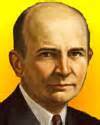A Quote by Georg C. Lichtenberg
Do not say hypothesis, and even less theory: say way of thinking.
Quote Topics
Related Quotes
For me, writing music is a good way to say what's on my mind. It's less vulnerable in a way, less embarrassing, less exposing to the idea of seeing someone's reaction. The thing about it, though, is you need to be ready... especially if you've got something you're burning to say... even if it's just what some people might think is just a small moment that nobody'd ever bother with or notice.
You say that my way of thinking cannot be tolerated? What of it? The man who alters his way of thinking to suit othere is a fool. My way of thinking is the result of my reflections. It is part of my inner being,the way I am made. I do not contradict them, and would not even if I wished to. For my system, which you disapprove of is also my greatest comfort in life, the source of all my happiness -it means more to me than my life itself.
However the machine would permit us to test the hypothesis for any special value of n. We could carry out such tests for a sequence of consecutive values n=2,3,.. up to, say, n=100. If the result of at least one test were negative, the hypothesis would prove to be false; otherwise our confidence in the hypothesis would increase, and we should feel encouraged to attempt establishing the hypothesis, instead of trying to construct a counterexample.
If criticism has made such discoveries as to necessitate the abandonment of the doctrine of plenary inspiration, it is not enough to say that we are compelled to abandon only a "particular theory of inspiration..." We must go on to say that that "particular theory of inspiration" is the theory of the apostles and of the Lord, and that in abandoning it we are abandoning them.
This general tendency to eliminate, by means of unverifiable speculations, the limits of the categories nature presents to us is the inheritance of biology from The Origin of Species. To establish the continuity required by theory, historical arguments are invoked, even though historical evidence is lacking. Thus are engendered those fragile towers of hypothesis based on hypothesis, where fact and fiction intermingle in an inextricable confusion.
When you are trying to impress people with words, the more you say, the more common you appear, and the less in control. Even if you are saying something banal, it will seem original if you make it vague, open-ended, and sphinxlike. Powerful people impress and intimidate by saying less. The more you say, the more likely you are to say something foolish.
If you sit down with a person, or a watermelon for that matter, when you're stoned and sing into it, the quality of the hallucination is such that there is a way of thinking about it where you could say, 'This is an acoustical hologram of the interior of their body.'" I don't say that.I just say, "My goodness isn't it strange that I seem to be able to see inside of the watermelon when I'm doing this.'




































